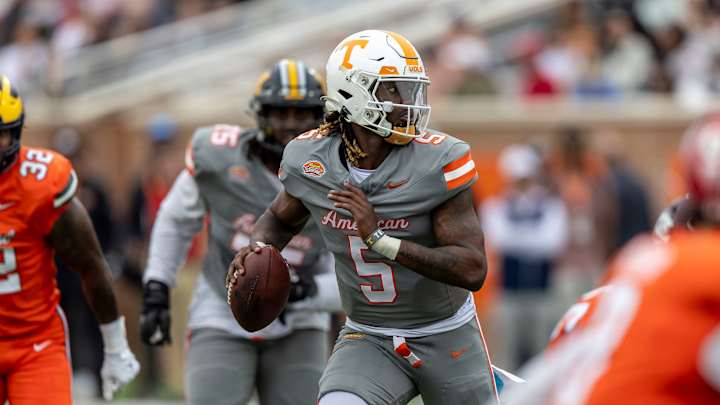Ravens Rumors: Draft Tennessee QB Joe Milton to Replace Tyler Huntley?

In this story:
The Baltimore Ravens had a major win in free agency when the team landed superstar rusher Derrick Henry as its new starting running back, but the team did suffer an underrated loss.
Although not a starter, the Ravens suffered a significant loss when it lost its backup quarterback, Tyler Huntley. However, could Tennessee draft prospect Joe Milton be the answer the team needs behind Lamar Jackson?
Baltimore may possess the reigning MVP in Lamar Jackson at quarterback, but last year was the first time in three years that he played more than 12 games, so the team needs to develop a good backup behind him in case of injury.
Standing 6-5, Milton has the prototypical size of a starting quarterback and an absolute cannon for an arm that could rival players like Josh Allen and Patrick Mahomes in power.
Missing #Tennessee football?
— Evan Crowell (@evanvcrowell) February 28, 2023
Here's some highlights from Joe Milton's MVP Orange Bowl performance. pic.twitter.com/N7GihSbQ7k
The issue is Milton is currently more of a workout warrior than a developed NFL signal caller. In 29 games at Tennessee, he threw 32 touchdowns and five interceptions but was criticized for a lack of touch on his passes.
Milton completed 61.5 percent of his passes during college. Jackson has completed 64.5 percent of his throws since coming into the NFL and has still been scrutinized by casuals who say he isn’t a good passer.
On top of all that, a major difference between how a quarterback like Milton is being evaluated versus how Anthony Richardson was valued in last year’s NFL Draft is perceived upside.
Richardson was also viewed as a project but was only 20 years old; coming out of the University of Florida, Milton is an older quarterback who still hasn’t shown the development most had hoped for out of him.
Can Derrick Henry Pass Jamal Lewis As GOAT Ravens RB?
While Jackson has proved naysayers wrong for thinking he couldn’t produce at the NFL level, Milton with his size and arm has had some believers, but is already 24 years old.
He may not ever be an elite decision maker, but in the NFL, but based on his upside and hoping that the Ravens can develop him could be worth spending a day three pick considering how low the risk and reward are.

Isaiah De Anda Delgado is a sports journalist and storyteller from Citrus County, Florida. He is currently a student at the University of Central Florida pursuing a degree in print journalism with a minor in sociology. He serves as a staff writer and reporter for the Men’s Journal and SI/FanNation networks, covering the NFL and NBA.
Follow IsaiahDDelgado